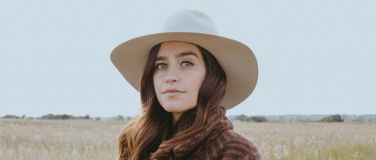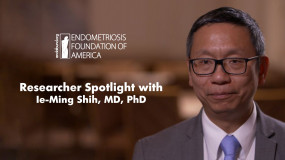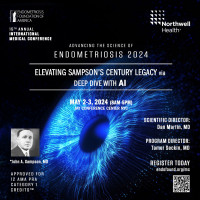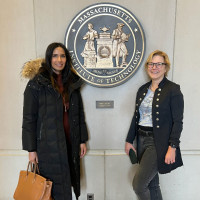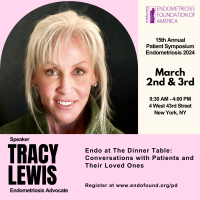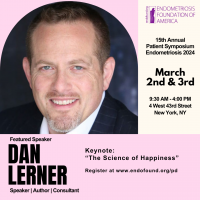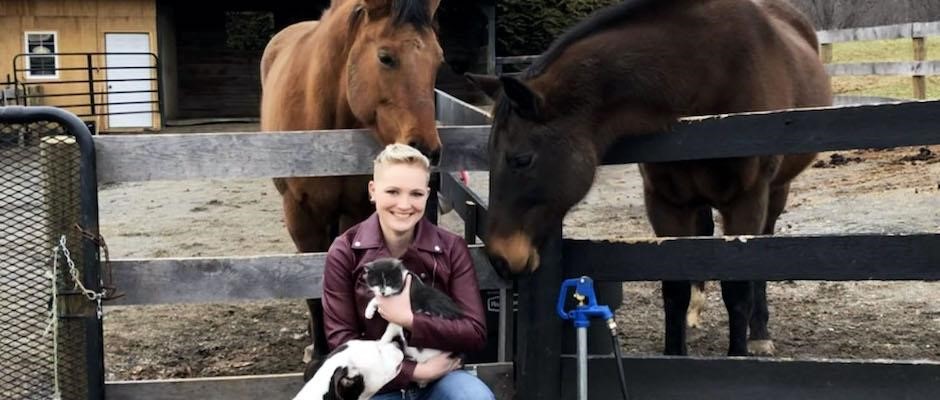
In 2016 Kianna Scott, endo patient and founder of EndoArmy, moved across the country to Virginia not knowing a single person in pursuit of her life-long dream of working in the veterinary industry with Olympic-level horses. It was shortly after her move when a doctor told her that her back pain was due to anxiety. The doctor told her to stop riding and working with horses forever which would have resulted in her losing her apartment, her job, and her new found life.
EndoFound spoke with Kianna last week about EndoArmy, why information and community remain as important as ever for endo patients, and how endo patients can continue to realize their dreams despite their disease. Today, Kianna is planning her Trail Ride Campaign, a 6-month journey on horseback from Mexico to Canada on the Pacific Crest Trail. Kianna never gave up on her dream, and her mission with Endo Army is stronger than ever: you can realize your dream too.
EndoFound: What inspired you to create EndoArmy?
Kianna Scott: I myself have endometriosis and it took me a really long time to get diagnosed. I've had really bad symptoms since I was about 11 years old. After seven doctors and going through the ringer, eventually, I figured out what it was myself and pursued the proper doctor for a diagnosis from there. So first and foremost, I just wanted an organization in this area that will help local people hear about endometriosis if they're in the same boat, where their doctors just don't know what endometriosis is. This idea mirrors a lot of existing nonprofits that are focusing on getting the word out there of what endometriosis is so more people can be diagnosed.
When I was diagnosed, I immediately went to online support groups because there was nothing in my area where I could speak to individuals who understood. Online groups are great in a lot of ways, but in some ways they're not. It's different knowing people online versus knowing them in person. You get empowered to a different level when you're having person-to-person communication versus through a computer screen. Also, online there's the ability to be a bit unfiltered and disrespectful to different people taking different journeys. I was looking at the cancer patient community and how there are so many support groups for cancer patients, but none for patients with endometriosis. Thus my goal took shape with the desire to create local, small groups of patients that can get together and help support each other, as well as sharing education through EndoArmy to these groups to empower them to make the best health choices for themselves. Ultimately the goal is to support patients on whatever their journey is and provide them with local tangible support when going through something that can be so painful.
EndoFound: That's so important. It's so true that online communication can be stunted with respect to in person support.
Kianna Scott: Yeah.
EndoFound: Do you, with EndoArmy, engage in any online platforms as well?
Kianna Scott: We do. Currently, we have our Facebook page (@EndoArmy), and a larger “Face Group”, (Endo Army (Endometriosis Warrior Awareness, Education, and Community), to share what we're doing, then we have local groups linked out from our main page. We have one page for Virginia, Maryland, and DC, one page for NC, and a page for CO. These are closed groups where we want people just in these areas to interact. In these small groups we share our local gatherings and then people who've met in person before can continue to communicate with each other in a safe space.
I'm previously from Colorado before I moved to Virginia. I started a group there with a lot of my friends who figured out they had endo from my story, and then a group in North Carolina led by my Co-Founder Karen Scoggins. So, we have three area groups on Facebook that help people get incorporated into our in-person meetings. We're not having in person gatherings right now with COVID, but we've been doing video chats to spark more personal interactions than typing. Once all of this blows over, we're going to start up the in-person gatherings again.
EndoFound: What has been the most empowering aspect in starting EndoArmy?
Kianna Scott: EndoArmy started as a blog for me. I just wanted to share my journey. From there I got a group of people together from Facebook that were in the area that never met anybody else with endo before. That first gathering was so powerful just to meet other people with the same story and share that connection. That is where I met our Co-Founder Karen who had heard what we were doing and drove all the way from NC. There were patients who talked about feeling utter hopelessness and like they were close to ending their lives. After this in-person gathering, I have not only seen these same patients continue to interact as close friends, but also have witnessed a whole mindset shift on how they're approaching fighting endometriosis. You feel so much more powerful when you have a team behind you, supporting you. It makes it feel like you can finally have the strength to get through this. So, seeing the positive emotional changes that have taken place in the patients who we've helped is very inspirational. Simply having support is probably the most powerful thing.
EndoFound: What has been the most challenging aspect?
Kianna Scott: The hardest thing—and you find this anywhere you go—is that for every five people who support you, there are some people that don't. There are a lot of different opinions. One of our goals with EndoArmy is to acknowledge all different opinions and educate patients on all different opinions so that they can make decisions for themselves. But our goal is never to discriminate or judge a patient for any choices or ideas that they have. If there's a patient who has gone through all the options and decides that they think it's best for them to take pharmaceuticals, we're not going to judge them for that. We'll tell them the potential side effects. We'll tell them the potential benefits and we'll say, no matter what you choose, we're here to support you. Because I think, both as a patient and as somebody running a nonprofit, the hardest thing has been the scrutiny and the judgment you get if your ideas don't align with other groups.
EndoFound: What inspired you to embark on the trail ride campaign?
Kianna Scott: I lived in Colorado before moving here. I've rode and trained horses nearly my whole life. As soon as I could ride a bike, I was pretending it was a horse. I tested out of high school, went to college early, and got my tech degree to work with horses. Within a year of graduating, I was offered a job working on the veterinary team of the USA’s Olympic horses in VA. I moved halfway across the country to do so. I was living my dream. This is something I'd always aspired to do. Working with the top of the top horses. I had my tech degree, I was riding every day, and my horse carrier was on track!
A little back story—I've always had painful periods. I remember back in tech school I was actually running anesthesia on a puppy and I passed out from pain, but my doctors always just told me it was normal. So I never put much thought into it, shortly after coming to VA I actually got a new symptom: absolutely debilitating back pain and numbness in my legs. That was during my journey of cycling through seven different doctors and the last one was a spinal specialist. He did MRIs and he basically told me, "We didn't find anything on your MRIs that is causing your pain. I think it's psychological and I think you need to move back home with your parents and stop working with horses because some women can't handle high stress carriers like yours." He told me this over the phone because he couldn't find time to fit me into his schedule to talk about the MRI results in person. I got off that phone appointment and I was absolutely sick to my stomach thinking, if this is in my head, if this is what the rest of my life is going to look like and I'm never going to be able to live my dreams, or be active in any capacity, and there is nothing they can do to help, I don't want to be here anymore. I didn’t want to die, I just didn’t know how I was going to handle being alive with that much pain and no help.
I was 22 years old and was being told to give up on my dreams for the rest of my life. What do you do when you're 22 and you're told to live in your parents' basement and take pain meds for the rest of your life?
Luckily, because of the knowledge that I have about medicine (from working in vet med), I kept pushing and I found one more doctor who diagnosed me and did my surgery and diagnosed me.
Afterwards, when I had a plan and I started regaining some of my life, I realized that awareness is something we need for the general public, not just the medical community. Because if you don't know you have endometriosis, you don't really care about researching it. It's not all that interesting if it doesn’t affect you… but maybe it is affecting them and they just haven’t been properly diagnosed.
So I thought that the ride campaign was not only a dream that I never thought I was going to be able to live and now I can, but also something to catch the attention of the general public that might otherwise not pay attention and could open the door for endometriosis education. Maybe my ride campaign will reach someone like me who had never heard the term and didn't really care to know but then they might think, "Oh you know what? I have those same symptoms! I didn’t know endometriosis caused back pain, but my back pain does get worse around my period! Maybe I should pursue further education."
The trail ride campaign is also to inspire patients who have been diagnosed that this disease doesn't mean that you can't live your dreams. It might be harder for us, it might take us longer, and we might have to do things in a roundabout way. For example I was supposed to leave this year yet even without COVID I wouldn't have been able to because of some of my health issues that arose. But I spoke with my doctors, we made a plan, and I will be doing the ride next year. Now, instead of fighting in silence, I have a whole medical team and patient community that is helping me achieve my dream!
That's one of the things that I'm pushing here: just because our lives look different doesn't mean that we can't live our dreams. And maybe, just maybe, our dreams will become more powerful! I want to be a person who inspires other patients to go out and live their dreams to raise awareness. I want to show them their future doesn’t have to be them bedridden and in pain. With the proper support and early intervention, that's not the case.
EndoFound: With everything going on right now, do you have any idea of when it could possibly happen? Has that been difficult to plan?
Kianna Scott: You have to start at a very specific time of year because it's a six month ride and you have to time it so that you're in certain parts of the trail during certain times of the year to ensure that the snow is melted.
I am trying very hard to make it happen about a year from now. I have to apply for my license in October for an exact date. This is the time that I was planning on going this year and I'm glad that plans changed because I probably would have been stuck halfway across the country in the middle of the COVID outbreak.
It has been very hard to plan. I’ve spent my whole life savings and have been learning how to renovate my trailer’s living quarters and how to be a makeshift mechanic to repair issues with my truck. I have also been researching routes, seeking sponsors, training my horses, and working full time (up until COVID).
It has been hard, but when you realize you have health problems, you look at your life and you think, am I really doing what I want to be doing with my life and am I living it to the fullest? We aren’t going to be here forever and our bodies won't last forever. On top of endometriosis I have struggled with cardiac problems and cancer. I advocate so much for endometriosis because honestly it had the biggest impact on my life thus far. But after fighting all my health issues I looked back and thought, there are two things I want to do in my life: I want to help other people and I want to ride horses, and this is the perfect way to join the two together.
EndoFound: That's very inspiring. It's beautiful how intertwined your journey with endometriosis and the diagnosis is with your love for horses. Can you speak more about your diagnosis journey?
Kianna Scott: Thank you, So, my diagnosis journey, like we talked about, was forever delayed. I'm also pretty sure a majority of the females in my family have endo. I come from a long line of painful periods, hormone problems, and early hysterectomy. So it was one of those things where I just thought, oh, periods are really painful, it is normal… because that's what my family knew.
So, we didn't really think much about why the periods were painful. Like I said, I was with horses. I was rough and tumble. I got bucked off and broke my pelvis and I didn't know for three years until I got a radiograph later. I wasn't one to give in to the pain. Doctors asked if the pain made me miss out on school or activities. Not really! I may throw up, be shaky, or even pass out but I’d still show up! So doctors didn’t think it was that bad.
What got me diagnosed was my back pain because it wasn't a traditional symptom, so it was something I felt I could talk about and pursue help for. That's another thing that's really important. Sometimes we need to talk about the symptoms that are not stereotypical. When people think of endo, they think of a painful period. They don't think of bowel issues or thoracic issues or skeletomuscular issues or anything else that can come with it. The fact that it was actually back pain that got me diagnosed makes my diagnosis journey a bit different.
EndoFound: What are your plans with EndoArmy in the future? Anything specific, anything you're looking forward to?
Kianna Scott: With my ride campaign, my goal is to get a following of other people that aren't already in the endo community and to raise money. I am seeking per mile sponsors, so every mile I complete, we'll be raising money to help patients within our groups. Something I would love to do in the future as this takes off is to find other patients out there who have great dreams and a social media following to get educated and speak up; to get the word out there, to really inspire them through the nonprofit to live their dreams and share their stories in a way that will help other patients. In the meantime, we’ll still be here in local communities slowly building more small groups in different areas.
As small groups grow, we’ll send their members out in their community to educate friends and family, talk in schools and to government officials, make gift baskets for other patients, and anything else they can do to both bring them closer together as an endo community but also get more word out in their local communities. Those are our two biggest visions right now. The Endo-Inspirer campaign, where we're going to take patients with dreams and try to inspire them to live them and support them through social media, as well as really focusing on helping these small community groups flourish.
EndoFound: Do you have any specific advice to endo patients on staying at home during this pandemic, avoiding the ER, and not being able to see a doctor as regularly?
Kianna Scott: Yeah. I've been struggling a bit with this because I was supposed to have two surgeries by this date and both of them have been postponed. It's hard. The pain is never in your head, and I never would suggest that, but your head can do a lot for managing how you can handle the amount of pain that you're in.
One of the best ways I help myself cope is, again, getting back to my community. We can't do in-person groups right now but we’ve been finding fellow patients and just video chat with each other, pick a movie that we all like and watch the movie over video chat with each other. Talk about your day, complain about your symptoms, whatever you need to do. Just feeling that community can put you in a stronger mental state to handle the heightened pain that you're probably going to be going through. Just because you're socially distanced doesn't mean you have to be completely isolated. If you want to join some of our groups online, we are going to be hosting Zoom calls amongst our members just to chat. Nothing formal. We don't have any agendas. We're not doing education at the moment because so many other groups are providing online education. We will just be hosting a time for patients to come together and just vent and talk and hang out.
Other than that, I think another thing that I always go back to that's super important in keeping your overall health is the way you eat. When you're stuck at home and you don't really want to cook and you don't want to clean because you just feel crappy, it's easy to go eat a jar full of M and M's. But I do think it's really important to focus on trying to maintain a healthy diet as much as possible while all this is going on because that can really help get you to where you need to be after this is all over.
Find your EndoArmy today!



